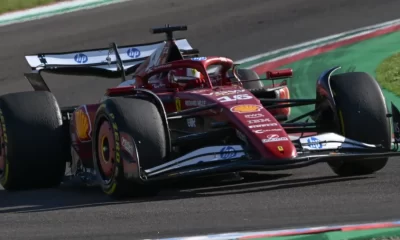Travel
Air traffic control chaos: Everything you are entitled to if your flight is delayed or cancelled
Here’s how to make sure you get your money back from airlines if your flight is cancelled – even if there are ‘extraordinary circumstances.’
It’s every traveller’s worst nightmare.
Thousands of flights have been cancelled or delayed after an air traffic control system failure in the UK on Monday.
Knock-on disruption is wreaking havoc for holidaymakers across Europe.
Delays could continue for days – but if you’re one of the unlucky travellers caught up in the mess, don’t worry.
Your airline owes you a ‘duty of care’. Here’s what that means and what you can claim.
What is an airline’s ‘duty of care?’
When flights are cancelled, passengers are often entitled to financial compensation – but the air traffic control fault falls under ‘extraordinary circumstances’.
This means airlines are not responsible for the disruption, and you won’t be due any compensation if your flight is cancelled or delayed.
However, airlines still owe you a ‘duty of care.’ If your flight is cancelled, you have the right to choose between a refund or an alternative flight.
If you choose the latter option – or your flight is delayed – the airline must provide you with the following while you wait at the airport:
- A reasonable amount of food and drink (often provided in the form of vouchers)
- A means for you to communicate (often by refunding the cost of your calls)
- Accommodation, if you are re-routed the next day (usually in a nearby hotel)
- Transport to and from the accommodation (or your home, if you are able to return there)
The airline needs to supply you with these items until it is able to fly you to your destination, no matter how long the delay lasts or what has caused it.
“If you are still waiting to come home, airlines have a responsibility to look after you while you wait,” explains Rob Bishton, Joint-Interim Chief Executive of the UK Civil Aviation Authority.
“This means providing you with meals, refreshments and hotel accommodation. If airlines cannot do this, you can organise your own meals and accommodation then claim costs back.”
EasyJet, for instance, issued delayed travellers with food and drink vouchers worth €9 after they had been waiting for three hours
How much money can you claim from airlines?
Before you launch into booking a hotel, make yourself known to an airline representative as they may offer you accommodation. Alternatively, if you are provided with vouchers from the airline, you’ll have a clear idea of how much you can spend.
In other instances, you will have to pay yourself – a particularly common outcome in cases of mass disruption. You have the right to organise “reasonable” care and assistance for yourself.
So how much, exactly, is ‘reasonable?’
Unfortunately, it’s hard to say.
Airlines deliberately don’t specify an exact threshold. A level of common sense applies – if your flight from Gatwick is delayed, you likely won’t be reimbursed for a five-star stay in central London.
But other questions are trickier. What if the only accommodation left is an expensive hotel? What if there’s nowhere to stay near the airport and you need to pay for a taxi?
Again, you are entitled to ‘reasonable’ support so both of these expenditures would likely be justified. But the grey area can be stressful.
To make sure you don’t get caught out, follow these steps.
How to make sure you get your money back from an airline
The first rule is simple: make sure you keep every receipt.
“If you end up paying for things yourself or booking your own replacement flight or hotel, keep every receipt and make sure your claim is not excessive,” advises Bishton.
The next step – a reimbursement claim – is trickier.
You must contact your airline to make a claim before you go to a third-party organisation like an alternative dispute resolution body (details further down the article). Otherwise they may throw out your claim on the grounds that you breached their terms and conditions.
Most airlines have claims options outlined on their websites.
The CAA urges passengers to “set out their case well, include all relevant information, and provide evidence that they were on a flight”.
“State exactly what compensation and expenses you are claiming,” they urge.
You should make sure you include:
- Your full contact details – including your address, email and phone number
- Full details of all passengers – including names and addresses
- Your booking reference and travel dates
- The flight number, departure and destination airports
- Details of where the disruption occurred
- Information about the length of delays
- The names of any staff you spoke to
Supporting documentation – such as receipts, tickets, boarding cards, and booking confirmation – will help your claim.
The Civil Aviation Authority has provided a helpful guide to making claims here.
What to do if the airline rejects your reimbursement claim
If the airline rejects your claim, you can appeal the decision in a few different ways.
“Arm yourself with knowledge and persistence—sometimes, airlines might initially reject your claim, but if you’re eligible under EU laws, don’t shy away from appealing the decision,” the International Driver’s Association warn.
Firstly, can refer your complaint to an ‘Alternative Dispute Resolution’ (ADR) body which looks at your complaint out-of-court. In the UK, these are the Centre for Effective Dispute Resolution (CEDR) and AviationADR. These are third party bodies that can help you argue your case.
Not all airlines are members of ADR schemes, however. If your airline isn’t signed up, you can escalate your complaint to the Civil Aviation Authority, which performs a similar function.
If this doesn’t work, you will have to go to small claims court.
This option is time-consuming and can be stressful, so you should make sure you have exhausted all other avenues first. Information on how to make a court claim can be found here.
In March, consumer advocacy organisation Which? found that airlines owe £4.5 million (€5.2 million) to passengers from outstanding County Court Judgments (CCJs).
Travel
Spain orders removal of more than 65,000 Airbnb tourist rentals it says violate regulations
ADVERTISEMENT
Spain has launched a major clampdown on Airbnb properties, ordering the removal of over 65,000 holiday rental listings across the country that fail to comply with regulations.
The Spanish Consumer Rights Ministry cited several violations, including missing licence numbers, not specifying whether the owner was an individual or a corporation, and discrepancies between listed information and official records.
The crackdown comes against the backdrop of Spain’s growing housing affordability crisis, which has sparked widespread protests over rising rents and home prices.
Many Spaniards blame short-term rentals on platforms like Airbnb for worsening housing shortages, particularly in popular tourist destinations like Madrid and Barcelona.
‘No more excuses’
On Monday, Spain’s Consumer Rights Minister Pablo Bustinduy said the move aimed to address the general “lack of control” and “illegality” in the holiday rental business.
“No more excuses. Enough with protecting those who make a business out of the right to housing in our country,” he told reporters.
The nationwide enforcement primarily targets listings in Madrid, Andalusia, and Catalonia, where tourism is most heavily concentrated.
The ministry said it had notified Airbnb about the noncompliant listings months ago, but that the company had appealed the move in court.
Spain’s government said Madrid’s high court had backed the order sent to Airbnb.
Bustinduy said it involved the immediate removal of 5,800 rental listings from the site. Two subsequent orders would be issued until the total of 65,935 removals is reached, he said.
Airbnb intends to appeal new ruling
Official data shows Spain had approximately 321,000 licensed holiday rentals as of November last year- a 15 per cent increase since 2020 – with many more operating without proper licenses.
The Consumer Rights Ministry opened an investigation into Airbnb in December last year.
Airbnb told Euronews Travel it will continue to appeal against all decisions linked to this case.
“No evidence of rule-breaking by hosts has been put forward, and the decision goes against EU and Spanish law, and a previous ruling by the Spanish Supreme Court,” a spokesperson said.
“The root cause of the affordable housing crisis in Spain is a lack of supply to meet demand. The solution is to build more homes – anything else is a distraction.”
The spokesperson added that governments across the world are seeing that regulating Airbnb does not alleviate housing concerns or return homes to the market: “It only hurts local families who rely on hosting to afford their homes and rising costs.”
Barcelona bans short-term rentals
Last year, the Spanish government launched a general crackdown on holiday rentals amid growing frustration among residents who say mass tourism is aggravating a housing crisis.
Locals say they are being priced out of their cities due to gentrification and landlords favouring more lucrative short-term tourist lets.
Barcelona has already taken aggressive measures to address the problem, announcing plans to eliminate all 10,000 licensed short-term rental apartments by 2028 to prioritise housing for permanent residents.
Travel
Brits could soon enjoy shorter passport control queues at EU airports. Here’s why
British holidaymakers will soon be able to use e-gates at more EU airports, the UK government has announced.
It comes as part of negotiations between the UK government and the European Union to finalise a ‘post-Brexit reset deal’.
It means British passport holders will no longer have to wait at manned desks and will instead be allowed to use fast-track e-gates usually reserved for EU or European Economic Area citizens.
EU Relations Minister Nick Thomas-Symonds said this would give British travellers “more time to spend on holiday or work trips […] doing what you want, not being stuck in queues.”
The UK government said the move would end “the dreaded queues at border control.”
UK travellers have to join ‘other nations’ queue at EU airports
Following Brexit, UK citizens forfeited their privileged status when travelling to EU countries.
They now fall into the ‘visa-exempt third-country nationals’ category – the same classification as travellers from dozens of countries, including Australia, Canada, New Zealand and Singapore.
This has meant British travellers must join the ‘other nations’ queue at border control rather than using the expedited EU lanes.
The requirement to check that British travellers meet entry conditions is a significant obstacle to allowing them to use the fast-track lanes.
EU border control has to verify that UK travellers are not in breach of the 90-day stay limit in 180 days and that they have the means to return to their country of origin, i.e. a flight ticket out of the EU.
Frontier officials must also stamp the passenger’s passport.
This change often translates to extended waiting times, especially at busy European airports like Amsterdam Schiphol, Milan Malpensa, and Paris Charles de Gaulle.
Waits exceeding an hour have become commonplace, especially when arriving shortly after large international flights.
These delays affect not only entry into EU countries but also departure, as British travellers must undergo exit checks that sometimes result in missed flights due to lengthy queues.
UK travellers will be able to use e-gates at many European airports
Under the new deal, British travellers will be able to take advantage of the faster e-gate passport checks at many EU airports.
No details have yet been released on when this will be introduced and where, although the BBC reported that British Prime Minister Keir Starmer “has called on all EU members to co-operate without delay.”
Some EU airports will likely allow UK travellers to use existing e-gates reserved for EU citizens, while others may install dedicated ‘third-country national’ e-gates.
The latter are already in place across Italy, including Venice Marco Polo and Rome Fiumicino, as well as at Amsterdam Schiphol and Lisbon.
With this system, once the traveller passes through the gate, there is a brief check by border officials who will also stamp passports.
Brits will use e-gates in all airports after introduction of EES
In addition, the UK government underlined that there will be “no legal barriers to e-gate use for British Nationals travelling to and from European Union Member States after the introduction of the European Union Entry/Exit System [EES].”
The EES is scheduled to come into force in October this year. The system will register non-EU visitors who don’t need a visa digitally, removing the need for physical stamps.
New pet passports will make it easier for Brits to bring pets into EU
The UK government also announced that new pet passports will be introduced as part of the deal.
This means UK cats and dogs will be able to travel “more easily” from the UK into the EU by “eliminating the need for animal health certificates for every trip.”
Travel
Brits will soon be able to dodge passport control queues by using e-gates at more European airports
Published on •Updated
ADVERTISEMENT
UK passport holders will soon be able to use e-gates at more EU airports, the UK government has announced.
It comes as part a “breakthrough” post-Brexit reset deal between the UK government and the European Union.
The UK government said the move would end “the dreaded queues at border control” with Brits being allowed to use fast-track e-gates usually reserved for EU or European Economic Area citizens at more airports.
EU Relations Minister Nick Thomas-Symonds said this would give British travellers “more time to spend on holiday or work trips […] doing what you want, not being stuck in queues.”
UK travellers have to join ‘other nations’ queue at EU airports
Following Brexit, UK citizens forfeited their privileged status when travelling to EU countries.
They now fall into the ‘visa-exempt third-country nationals’ category – the same classification as travellers from dozens of countries, including Australia, Canada, New Zealand and Singapore.
This has meant British travellers must join the ‘other nations’ queue at border control rather than using the expedited EU lanes. The requirement to check that British travellers meet entry conditions is a significant obstacle to allowing them to use the fast-track lanes.
EU border control has to verify that UK travellers are not in breach of the 90-day stay limit in 180 days and that they have the means to return to their country of origin, i.e. a flight ticket out of the EU.
Frontier officials must also stamp the passenger’s passport.
This change often translates to extended waiting times, especially at busy European airports like Amsterdam Schiphol, Milan Malpensa, and Paris Charles de Gaulle.
Waits exceeding an hour have become commonplace, especially when arriving shortly after large international flights.
These delays affect not only entry into EU countries but also departure, as British travellers must undergo exit checks that sometimes result in missed flights due to lengthy queues.
UK travellers will be able to use e-gates at many European airports
Under the new deal, British travellers will be able to take advantage of the faster e-gate passport checks at many EU airports.
No details have yet been released on when this will be introduced and where, although the BBC reported that British Prime Minister Keir Starmer “has called on all EU members to co-operate without delay.”
Some EU airports will likely allow UK travellers to use existing e-gates reserved for EU citizens, while others may install dedicated ‘third-country national’ e-gates.
The latter are already in place across Italy, including Venice Marco Polo and Rome Fiumicino, as well as at Amsterdam Schiphol and Lisbon.
With this system, once the traveller passes through the gate, there is a brief check by border officials who will also stamp passports.
Brits will use e-gates in all airports after introduction of EES
In addition, the UK government underlined that there will be “no legal barriers to e-gate use for British Nationals travelling to and from European Union Member States after the introduction of the European Union Entry/Exit System [EES].”
The EES is scheduled to come into force in October this year. The system will register non-EU visitors who don’t need a visa digitally, removing the need for physical stamps.
New pet passports will make it easier for Brits to bring pets into EU
The UK government also announced that new pet passports will be introduced as part of the deal.
This means UK cats and dogs will be able to travel “more easily” from the UK into the EU by “eliminating the need for animal health certificates for every trip.”
-

 EU & the World6 days ago
EU & the World6 days agoWho Is Valeria Marquez? About the Influencer Who Was Shot During Livestream
-

 EU & the World4 days ago
EU & the World4 days agoChris Brown Tour 2025: Updates on Concert Dates, Cities, Ticket Prices & More
-

 EU & the World5 days ago
EU & the World5 days agoWho Is Ben Cohen? About the Ben & Jerry’s Co-Founder Who Was Arrested During Senate Hearing
-

 EU & the World3 days ago
EU & the World3 days agoJosh Freese: 5 Things to Know About the Former Foo Fighters Drummer
-
Travel7 days ago
Crete earthquake: Is it safe to travel to the Greek island following tsunami warning?
-

 EU & the World5 days ago
EU & the World5 days agoChris Brown’s Net Worth: How Much Money He Makes Now
-

 Entertainment4 days ago
Entertainment4 days agoEurovision 2025: Music, Politics, and the Final 26 Set Amid Controversy and Spectacle
-

 Sports4 days ago
Sports4 days agoFerrari, opposing views after first day at Imola for Charles Leclerc and Lewis Hamilton









